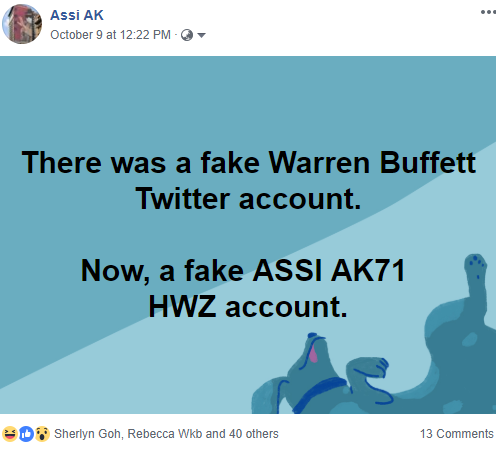Not too long ago, I said I trimmed my position in Centurion Corp.
If you don't remember or if you missed it, see:
Reallocate as interest rate rises.
Centurion Corp. is now one of my smaller investments because I went on to trim my position further as its share price rose in recent days.
My investment in Centurion Corp. was no longer one that gave me peace of mind and, hence, the decision.
I am just being consistent as I said before that if I keep thinking about an investment and not in a good way which means I am worried, then, I am probably over invested.
I am feeling pretty good now with a smaller investment in Centurion Corp.
 |
| Source: AK asks 2 questions. |
My investment thesis of so many years ago is now being brutally challenged.
In a rising interest rate environment, it makes sense to me that highly leveraged entities will find it more challenging to bring home the bacon but if they could increase their income while controlling other costs, it is not too bad.
However, if they have regulatory issues which could impact their income negatively to deal with, then, the picture becomes hazy and I feel that this might be the case with Centurion Corp.
I invested in Centurion Corp. primarily for income but with interest rate going higher and, more importantly, regulatory issues regarding PBWA capacity, it is less certain that the dividends which I expect from the investment are going to be sustainable or even forthcoming.
Already, the number of beds are reduced in certain assets and we could see the same thing happening in other assets in the not too distant future which would also require additional CAPEX when Centurion Corp. is already lacking a strong balance sheet.
As an investor for income, if I could get a dividend yield of 4.5% or so by investing in the local banks which should also enjoy a strong tailwind from rising interest rate, the case for investing in Centurion Corp. for income weakens considerably.
Investing in Centurion Corp. for income now only becomes a superior strategy if it can pull off a Saizen REIT and long time readers of my blog would know what I am talking about.
Saizen REIT was trading at a big discount to NAV too but the REIT was also consistent in distributing meaningful income while Centurion suspended dividends for two years and could do so again.
Saizen REIT was also selling their buildings at a considerable premium to their valuations which confirmed that the REIT was truly undervalued.
Centurion Corp. could unlock value by selling some of their assets just at valuation and that would unlock lots of value since its common stock is trading at such a huge discount to its NAV per share.
As interest rate rises, cap rates should expand and that is when we could see asset valuations declining.
Still, with such a big discount to NAV and if the valuations are credible, value could be unlocked for shareholders through a partial sale of assets even at a slight discount to valuations.
If this were to happen, then, I would have made a mistake by significantly reducing my exposure to Centurion Corp.
This is why I retain a smaller investment in Centurion Corp. so that I would suffer a weaker form of seller's remorse in such an instance.
Well, I am only human and can only do what I feel is right for me.
Don't play play and anyhow follow.
Recently published:
Trading Chinese tech stocks for pocket money.
Related post:
Saizen REIT: Deeply undervalued.

















